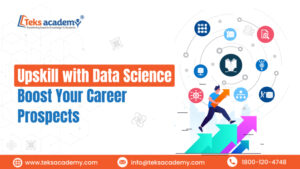Hello Future Data Leaders! In the fast-growing technological world, Data Science stands as a boom. In simple it is the study of data that draws meaningful insights for organizations. It is an interdisciplinary approach that combines principles and practices of various fields. Namely, mathematics, statistics, artificial intelligence, and computer engineering to analyze large amounts of data. Data Science is a driving force behind many of the businesses to make informed decisions. Due to technological advancement the need for skilled data professionals has rapidly increased.
Aspiring to upgrade with the Best Data Science course not only equips you with the knowledge to interpret complex data. But it also opens doors to exciting and high-paying career opportunities. Endowing in data science is a strategic move that will set you apart in the current competitive job market.
Table of Contents:
What are the career opportunities in Data Science?
Skills required to become a Data Scientist
List of technologies emerging in Data Science
Who can join the Data Science Course?
What are the career opportunities in Data Science?
Data science is a gateway for numerous exciting career paths. Each will offer unique challenges and rewards. As the opportunities for skilled professionals are growing, here are the top career roles in data science:
Data Scientist: It is the core role of data science. They collect, analyze, and interpret the complex data of companies. By applying skills like statistics, mathematics, and programming. A Data Scientist can provide valuable information on consumer behavior and their actions. Helps in designing strategies and business plans.
Responsibilities: Identify valuable data, Data compiling, Analyze Trends, preprocessing of structured and unstructured data.
Salary: 8 L – 15 L per year.
Data Analyst: It is the technical role. They focus on understanding data and creating reports. That helps the companies to make decisions. The Data Analyst transfers the information to company leaders and other stakeholders.
Responsibilities: Data Cleansing, Data Analyzing, Data Visualization, keep up database.
Salary: 4 L – 8 L per year.
Data Engineer: A data engineer is an IT professional, whose prime job is to prepare data for operational uses. They are typically responsible for bringing information from different source systems. Engineer’s work for improving data transparency to make trustworthy business decisions.
Responsibilities: Data collection and analysis, designing data pipelines, managing databases, and making sure of data quality.
Salary: 7 L – 12 L per year.
Machine Learning Engineer: In general terms ML Engineer is nothing but a programmer who designs software which automates artificial intelligence and machine learning (ML) models. They develop algorithms and models to predict future trends based on historical data.
Responsibilities: Design ML systems and analyze and improve ML algorithms.
Salary: 8 L – 18 L per year.
Business Intelligence (BI) Analyst: BI Analysts builds the business strategy and decision-making for an organization by using raw data. They evaluate the data of the company and the data of competitors. Such that they discover ways to improve their own company’s market position and increase the profit margin.
Responsibilities: Analyze business data and create dashboards and customer engagement metrics.
Salary: On average a BI analyst can earn from 5 to10 Lakhs per annum.
Skills required to become a Data Scientist:
As a Data Scientist, one must and should acquire both technical and non-technical skills. These skills will guide you in building the career as the best data scientist.
Technical Skills:
Programming: A Data Scientist is one who should be proficient in programming skills like Python and R. These are powerful tools for data manipulation and analysis. With this knowledge, one can work with large data sets, statistical analysis, and machine learning models. Python has extensive libraries like;
- NumPy
- PyTorch
- Pandas and
- Matplotlib
These are useful for industries. R is equally valuable, mainly for statistical analysis and data visualization.
Machine Learning Techniques: ML algorithms regarded as the heart of Data Science. The following are the four important algorithms;
- Supervised
- Unsupervised
- Semi-supervised, and
- Reinforcement.
These techniques allow data scientists to build predictive models. Which can forecast trends and make informed decisions. Machine learning also involves and uses advanced library systems like TensorFlow, Keras, and Scikit-learn. These libraries enable us to implement such models efficiently.
Data Visualization: It is the essential key for communicating complex data insights in a clear and short way. Tools used are Tableau, Power BI, and Looker. These are helpful in creating charts, graphs, and dashboards. That makes data accessible to non-technical stakeholders. Effective visualization is simply storytelling with data.
Non-Technical Skills:
Problem-Solving Ability: A successful data scientist must have the ability to break down a problem. Must recognize the right data source and implement accurate analytical techniques to find a solution. Should acquire skills like critical thinking, creativity, and the ability to approach problems from zones. Strong problem-solving skills will set you as the great one.
Business Acumen: Being knowledgeable of business context is key to making data science relevant and impactful. Must be skilled in understanding industry trends, customer behavior, and market dynamics. With strong business acumen, data scientists create more value with their analyses.
Adaptability and Continuous Learning: Data Science is the field of constantly advancing with new tools, techniques, and challenges emerging regularly. Data scientists must be curious to continuously update their skills. Which involves staying active with industry trends, learning new technologies, and being open to new ways of thinking.
List of technologies emerging in Data Science
Data science is continuously updated with the latest technologies. Let’s have a look at leading technologies that are shaping the future of data science. Whether you are an experienced data scientist or a novice learning the Best Data science course will upgrade your skills.
| Technology | Explanation |
| Augmented Analytics | It controls AI and machine learning to automate data preparation, insight generation, and visualization. One of the most powerful tools for data analysis, making it more intuitive and efficient for businesses |
| Edge Computing | This technology reduces latency and bandwidth usage, making real-time analytics easier. It is mostly used in autonomous vehicles, health care, smart grid, and manufacturing. |
| Artificial Intelligence | Artificial Intelligence (AI) continues to advance, enabling more advanced machine learning models and predictive analytics. AI can process large datasets, uncover patterns, and make predictions with high accuracy. |
| Quantum Computing | Unlike classical computers, quantum computers use qubits, which can represent and process multiple states simultaneously. This capability allows quantum computers to solve complex problems and perform calculations at speeds previously unimaginable. |
| Hybrid Cloud Computing | Hybrid cloud computing combines private and public cloud resources, offering flexibility for data storage and processing. This allows organizations to optimize their infrastructure by balancing workloads between on-premises systems and cloud environments. |
Who can join the Data Science Course?
Today, Data Science is standing as the most demanding course. Here is a breakdown of qualifications that can help you to succeed in this exciting field. Are you doubting Whether you are eligible for the course or not? Here is top Data science online course available at Teks Academy –The best software training institute in Hyderabad.
Graduates: Recently passed out or individuals with degrees in Computer Science, Mathematics, Statistics, and Engineering.
Working Professionals: Experienced professionals from IT, finance, healthcare, marketing, and more, looking to advance their careers.
Programmers: Those skilled in Python, R, SQL, or Java who want to apply coding in data science.
Data Enthusiasts: Anyone passionate about data and analytics.
Entrepreneurs and Business Analysts: Those seeking to use data science for better decision-making and business growth.
Conclusion:
Building a career in data science is a strategic move to future-proof your career. Mastering the best skills will make you stand out from the competition. In the above, we have discussed the essential skills to prosper as a data scientist. Also looked at emerging technologies such as edge computing, artificial intelligence, and so on. This helps in reshaping how data is analyzed and utilized across industries. To optimize your career in data science, it’s important to choose the right place for learning. Here the






